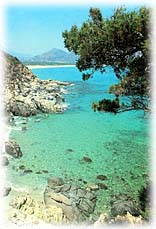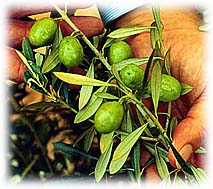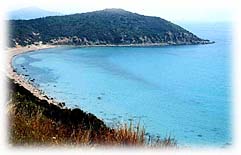 by Anna Rita Mazzoli
by Anna Rita Mazzoli
Biologist and nutritionalist
"The Mediterranean Diet"
More and more over the last few years we have heard the "Mediterranean
diet" being talked about as the finest form of nutrition we can possibly
use, but what in fact does it really mean and why are people so interested
in it? To start with, the original meaning of the word "diet",
nowadays usually only associated with low calorie slimming regimens and
self-denial, signifies a "way of life and a rule of life", and
is related, in this specific case, with the act of eating.

Mediterranean |
Having made this point, the MEDITERRANEAN DIET is the centuries-old
traditional food that the people living around the area of the Mediterranean
Sea ate until the 1950's, the time of the economic boom. It was a simple
diet, based essentially on the consumption of foods of vegetable origin
(cereals, legumes, fruit and other vegetables), accompanied by a moderate
consumption of olive oil, whose plant is to be found growing widely in
all the countries situated around the Mediterranean. The consumption of
foods of animal origin was extremely limited and usually based on products
from the sea, like fish. The positive role of this type of diet in the
prevention of illnesses that are characteristic of our modern day, like
cardiovascular diseases, emerged from the earliest studies, first started
by A. Keys at the University of Minnesota in the 1950's.

Olives and olive oil, essential elements
in the Mediteranean diet (Foto FAN) |
What are the most important characteristics of this diet? First of
all, it is based on an extremely high consumption of complex carbohydrates,
in particular wheat and its derivatives (bread and pasta), and these form,
together with a small percentage of simple sugars, 65% of the nutritive
origins of the diet. 25% is formed by the consumption of lipids (olive
oil), another 10% by proteins (meat, fish, legumes), which are mainly
of vegetable origin: cereals and beans, like the combination of "pasta
and beans", provide high quality proteins and can be used as a suitable
alternative to meat; moreover the limited amount of lipids contained in
the various types of legumes (beans, chick-peas, broad beans, lentils,
peas) help balance our diet, which is generally too rich in fats.

Mediterranean |
The high fibre content (fruit, vegetables, legumes) is extremely
important and, apart from creating the feeling of a full stomach, is also
useful for a correct digestion and intestinal transit. In conclusion,
the wide variety of aromatic plants present in Mediterranean Countries,
like basil, parsley, rosemary and sage, make it possible to create highly
flavoured meals while also consuming a limited amount of seasoning.
 
by
Silvia Messeri
& Sandro Pintus
|

 by Anna Rita Mazzoli
by Anna Rita Mazzoli




